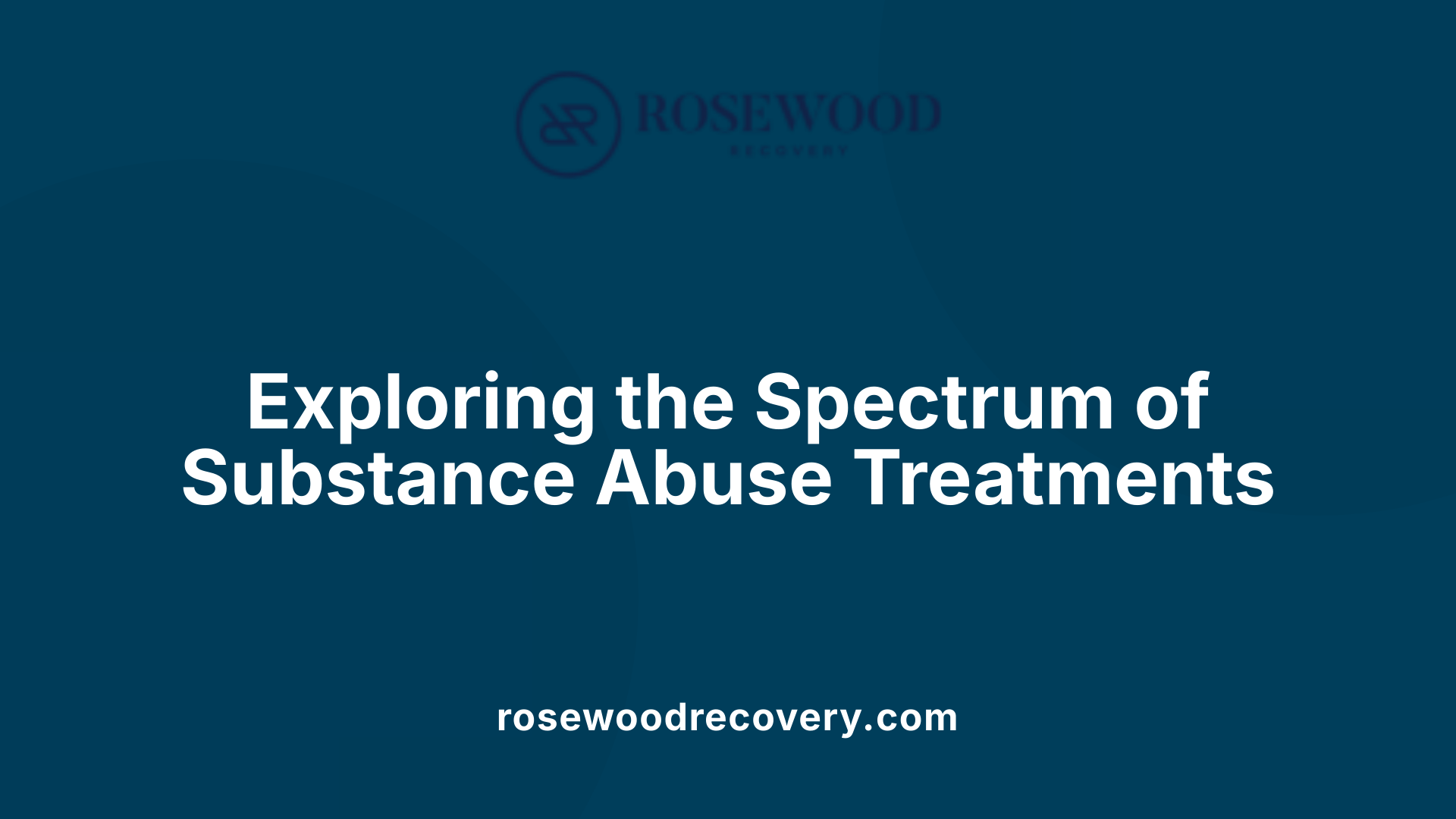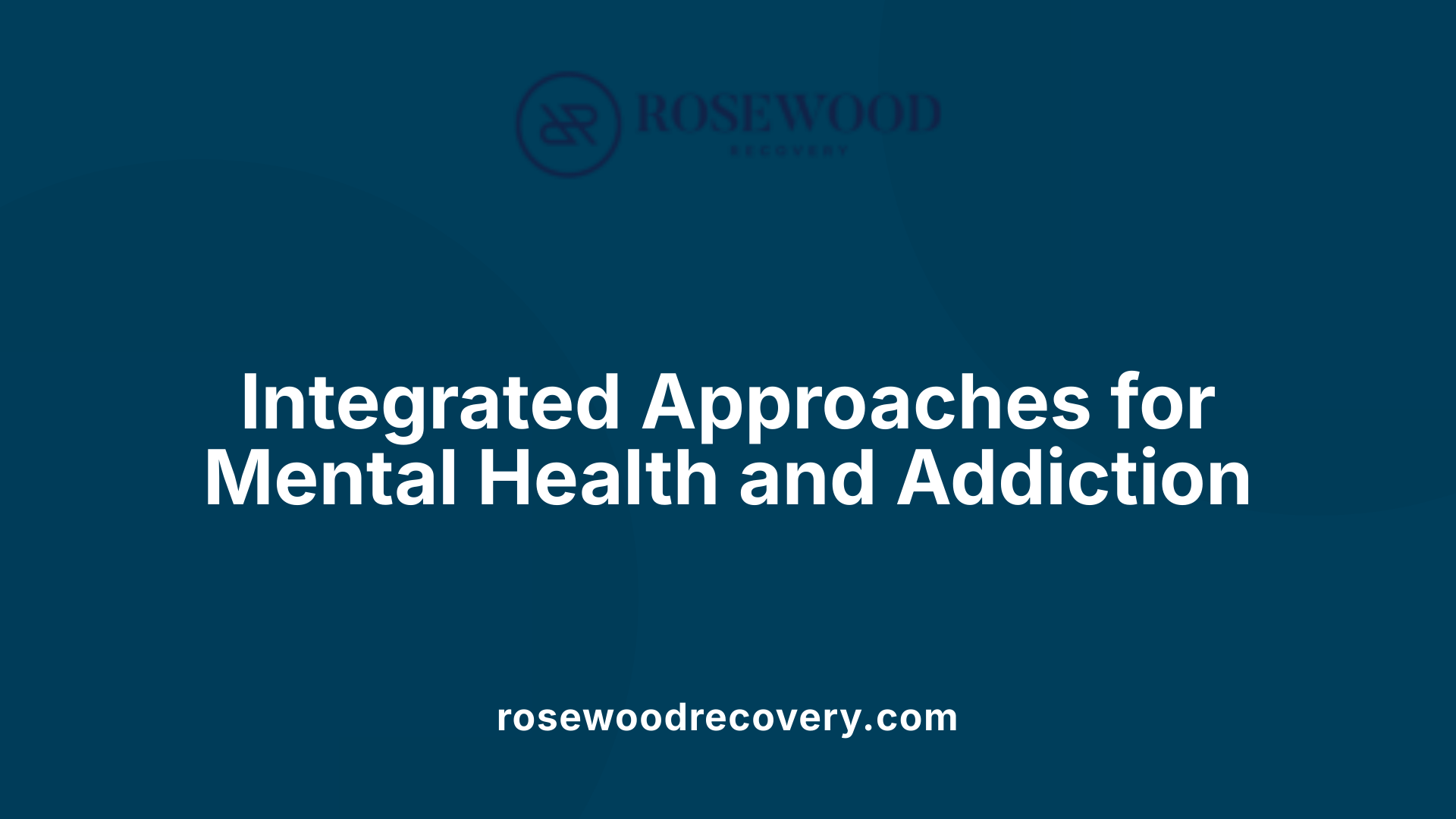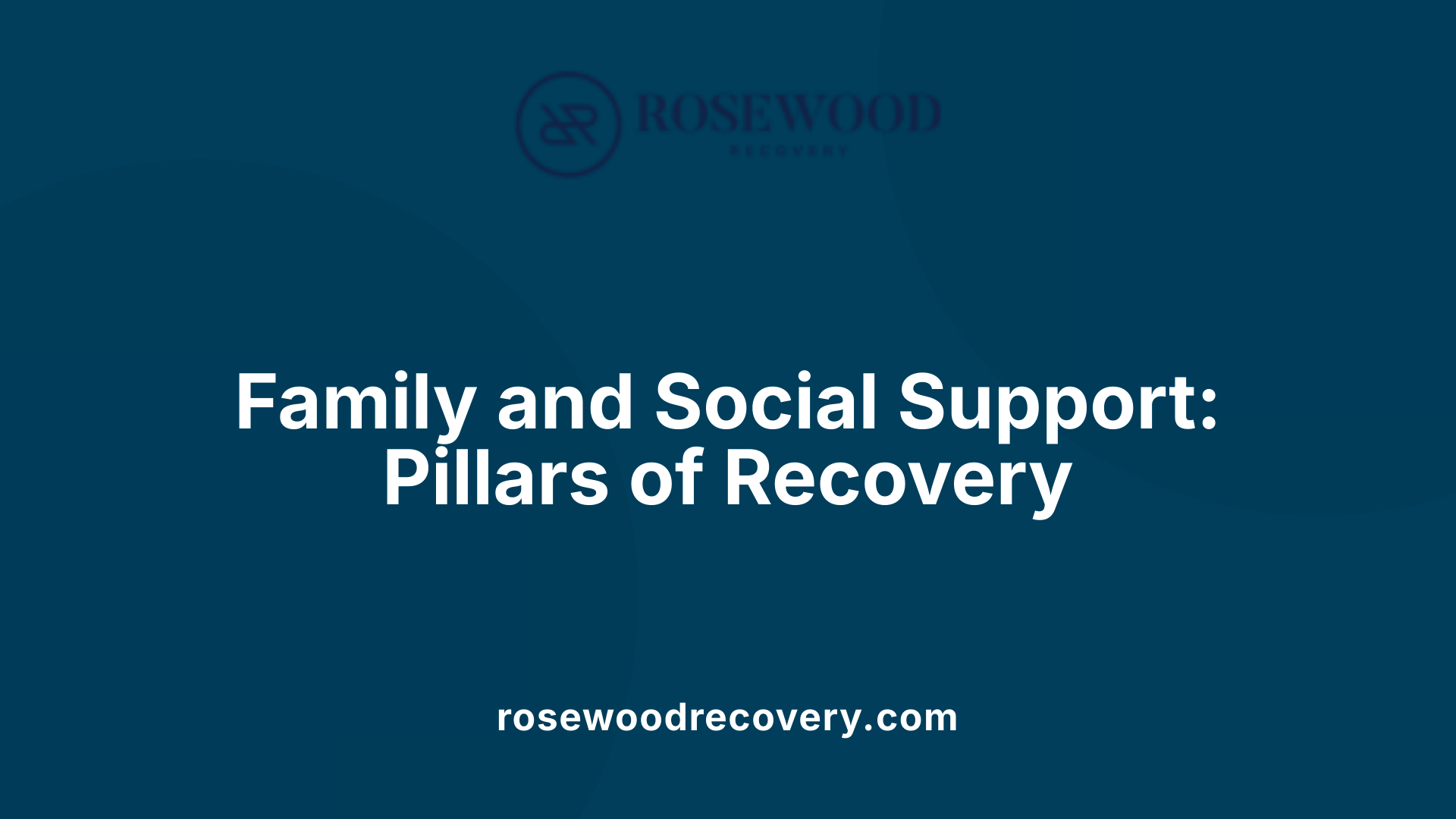Understanding Outpatient Addiction Treatment and Its Impact
Outpatient addiction programs have emerged as vital components in the continuum of care for individuals battling substance use disorders. These programs provide flexible, evidence-based treatment options that support recovery while allowing individuals to maintain their daily responsibilities. Increasingly recognized for their effectiveness, outpatient services offer comprehensive care that addresses not only the addiction itself but also co-occurring mental health issues, encouraging long-term sobriety and healthier lifestyles.
Comprehensive Treatment Services for Substance Abuse: An Overview

What comprehensive treatment services are available for substance abuse?
Comprehensive treatment services for substance abuse include a broad spectrum of interventions designed to meet the diverse needs of individuals struggling with addiction. These services typically begin with detoxification if necessary, followed by varying levels of rehabilitation such as inpatient, residential, and outpatient programs tailored to the severity and specifics of the substance use disorder.
Range of treatment modalities
Treatment modalities span from medication-assisted treatments using FDA-approved drugs like methadone, buprenorphine, and naltrexone, to intensive outpatient programs (IOPs) offering structured therapy several times per week. Programs may be community-based or hospital-affiliated, providing flexibility and accessibility.
Behavioral therapies involved
Central to these services are evidence-based behavioral therapies including cognitive-behavioral therapy (CBT), motivational interviewing, contingency management, and 12-step facilitation programs. These therapies aim to change harmful behaviors, manage cravings, and prevent relapse through skill-building and support.
Support systems and personalization
Support systems are integral—they include family therapy, peer support groups, sober living environments, and ancillary therapies such as mindfulness or art therapy. Treatment plans are personalized based on individual needs, co-occurring mental health disorders, and social contexts, ensuring that care is effective and responsive.
Treatment duration and access considerations
Duration of treatment varies, with longer programs (three months or more) linked to better outcomes. Accessibility is enhanced by offering outpatient services, telehealth options, and community-based programs, helping individuals balance treatment with daily responsibilities. Reducing stigma and improving insurance coverage are also essential to encourage treatment engagement.
Comprehensive services thus provide a holistic approach that includes medical, psychological, and social support tailored to promote sustained recovery and improved overall functioning.
Addressing Mental Health Disorders Within Addiction Treatment

How are mental health issues addressed in addiction treatment programs?
Mental health disorders are addressed within addiction treatment through integrated, comprehensive approaches that simultaneously focus on both substance use and co-occurring psychiatric conditions. Programs utilize multidisciplinary treatment teams comprising psychiatrists, psychologists, social workers, and addiction specialists who collaboratively assess individual needs.
Personalized psychotherapy is a cornerstone of treatment, with cognitive-behavioral therapy (CBT), motivational interviewing (MI), family therapy, and evidence-based trauma therapies such as prolonged exposure therapy incorporated to target specific mental health issues like PTSD, anxiety, and depression.
Medication management tailored to co-occurring disorders complements psychotherapy, addressing symptoms of bipolar disorder, depression, or anxiety while supporting substance use recovery.
Support services, including crisis helplines, sober living environments, and mutual-support groups, reinforce recovery by creating stable environments and encouraging ongoing engagement.
Together, these integrated strategies improve treatment outcomes by reducing relapse rates and hospitalizations, while fostering sustained recovery in community-based outpatient settings and beyond.
Types of Addiction Treated in Comprehensive Rehabilitation Settings

What types of addiction are commonly treated in comprehensive rehabilitation centers?
Comprehensive rehabilitation centers treat a broad spectrum of addictions, addressing both substance use disorders and behavioral addictions. Substance use disorders include dependencies on alcohol, opioids, stimulants (e.g., cocaine, methamphetamine), sedatives, inhalants, marijuana, hallucinogens, synthetic drugs, benzodiazepines, steroids, caffeine, and nicotine. Alongside these, behavioral addictions such as gambling, internet addiction, gaming, shopping, and eating disorders are also commonly managed.
Treatment modalities and intensity levels
These centers employ varied treatment approaches depending on the severity and nature of the addiction. Modalities include:
- Detoxification and Medication-Assisted Treatment (MAT): To safely manage withdrawal symptoms and support abstinence.
- Individual and Group Counseling: Providing personalized and peer support.
- Behavioral Therapies: Such as Cognitive Behavioral Therapy (CBT) and motivational interviewing, which help modify harmful thought and behavior patterns.
- Holistic Therapies: Including art therapy, music therapy, yoga, and mindfulness, promoting overall well-being.
Programs are offered at different intensity levels, including standard outpatient programs, intensive outpatient programs (IOPs), partial hospitalization, residential treatment, and inpatient services. This flexibility allows treatment to be tailored to each individual's needs and addiction severity.
Support structures and therapeutic combinations
Beyond direct treatment, comprehensive rehabilitation emphasizes ongoing support mechanisms. These include:
- Support Groups: Such as Alcoholics Anonymous and Narcotics Anonymous provide community and accountability.
- Sober Living Environments: To assist reintegration into daily life within supportive settings.
- Family Involvement: Family therapy and education play a critical role in recovery, improving communication and reducing relapse triggers.
This multifaceted approach enhances the likelihood of sustained recovery and social reintegration.
| Addiction Type | Treatment Modalities | Support Structures |
|---|---|---|
| Substance Use (alcohol, opioids, stimulants, etc.) | Detox, MAT, CBT, group therapy, holistic therapies | Support groups, family therapy, sober living |
| Behavioral Addictions (gambling, internet, eating) | Individual counseling, behavioral therapies, motivational interviewing | Community support, family involvement |
Through combining evidence-based therapies and robust support systems, rehabilitation centers effectively address a diverse spectrum of addictions, facilitating personalized and comprehensive care.
Intensive Outpatient Programs (IOPs): Structure and Effectiveness

What are Intensive Outpatient Programs (IOPs) and how often do sessions occur?
IOPs are specialized treatment services for individuals struggling with substance use disorders or co-occurring mental health issues who do not require detoxification or constant supervision. These programs provide at least 6 to 9 hours of structured therapy and psychoeducation sessions each week. This intensity allows patients to receive comprehensive care without full residential placement.
In which settings are IOPs provided?
IOPs are flexible and accessible, typically offered in diverse settings such as hospitals, community centers, and private treatment facilities. This variety enables them to serve wide-ranging populations effectively while allowing patients to remain within their home environments.
How do IOPs compare with inpatient treatment in effectiveness?
Research consistently shows that IOPs perform as well as inpatient or residential programs in reducing substance use and problem severity. Multiple randomized controlled trials reveal that patients in IOPs achieve comparable abstinence rates and reductions in drug or alcohol use over follow-ups spanning from several months to beyond a year. This robust evidence base supports the use of IOPs as a cost-effective alternative to inpatient care.
What patient profiles typically benefit from IOPs?
IOPs are particularly suited for individuals with mild to moderate substance use disorders who have supportive home environments and motivation to engage in recovery. They also effectively serve patients with co-occurring mental health conditions when integrated dual diagnosis treatment is employed. Additionally, IOPs can act as step-down care after inpatient treatment or as a primary treatment modality for those not requiring round-the-clock supervision.
Cost-Effectiveness and Flexibility of Outpatient Addiction Treatment
How does outpatient addiction treatment provide financial benefits compared to inpatient care?
Outpatient programs like Intensive Outpatient Programs (IOPs) are generally more cost-effective than inpatient treatment. Since outpatient care does not include room and board expenses, patients and healthcare systems often face lower overall costs. This financial advantage helps reduce economic barriers to accessing quality addiction treatment.
Can individuals maintain their daily roles during outpatient treatment?
One major benefit of outpatient addiction treatment is its flexibility. Individuals can continue living at home and maintain responsibilities such as work, family care, or education while receiving structured therapy and support. This flexibility promotes consistent engagement and helps patients apply coping strategies directly in their everyday environments.
What impact does outpatient treatment have on community reintegration and recovery?
Outpatient services allow patients to stay connected to their communities, fostering social support essential for sustained recovery. Being embedded in their usual environment enables people to gradually rebuild social roles and strengthens recovery engagement. Moreover, outpatient programs often link patients with mutual-support groups and community resources, further enhancing reintegration and long-term success.
Core Therapeutic Modalities Used in Outpatient Settings
What therapeutic methods are most commonly used in outpatient addiction treatment?
Outpatient programs employ a variety of evidence-based therapies tailored to address the complexities of substance use disorders. Cognitive-behavioral therapy (CBT) is a cornerstone, helping individuals identify and change harmful thought patterns and behaviors linked to substance use. Dialectical behavior therapy (DBT) complements CBT by enhancing emotional regulation and coping skills, crucial for those who struggle with intense emotions or co-occurring mental health disorders.
How do group and family therapy contribute to recovery in outpatient programs?
Group therapy provides a supportive community environment where participants share experiences, foster mutual encouragement, and build social support. Family therapy actively involves loved ones in the treatment process, improving communication, reducing familial triggers, and reinforcing positive behavioral changes. This combined approach strengthens interpersonal relationships critical for sustained recovery.
What relapse prevention strategies are included in outpatient care?
Relapse prevention is integral, involving education about triggers and development of practical coping mechanisms. Patients learn stress management, problem-solving skills, and ways to maintain sobriety in challenging situations. Regular monitoring and involvement in mutual-support groups further enhance the ability to sustain long-term abstinence.
How is medication management integrated into outpatient treatment?
When appropriate, medication-assisted treatment is incorporated alongside psychosocial therapies to address opioid dependence and other substance use disorders. This integration supports cravings management and withdrawal symptoms, improving engagement and outcomes.
Together, these core modalities create a comprehensive, flexible outpatient framework that addresses both the behavioral and biological facets of addiction while maintaining accessibility and continuity of care.
Addressing Co-Occurring Disorders Through Dual Diagnosis Outpatient Care
What Are Integrated Treatment Models for Dual Diagnosis?
Integrated treatment models in outpatient care address both substance use disorders (SUD) and co-occurring mental health conditions simultaneously rather than sequentially. This approach is crucial because many individuals struggle with intertwined issues such as addiction and depression, anxiety, bipolar disorder, or PTSD. By combining services in one coordinated program, outpatient dual diagnosis care promotes more effective outcomes by tailoring treatments to the complex needs of patients.
What Specific Therapies Are Used for Trauma and Mood Disorders?
Outpatient programs use evidence-based therapies designed for co-occurring conditions. Cognitive Behavioral Therapy (CBT) is frequently employed to manage both addiction and mood symptoms. For trauma, prolonged exposure therapy within the CBT framework specifically targets PTSD symptoms. Dialectical Behavior Therapy (DBT) also supports emotional regulation and distress tolerance, benefiting patients with mood disorders.
What Benefits Arise from Concurrent Management of Substance Use and Mental Health?
Concurrent treatment in outpatient settings leads to significant reductions not only in substance use but also in associated psychiatric symptoms like depression and PTSD. Research shows improvements in social functioning and patients’ satisfaction with their lives after integrated participation. This holistic approach enhances medication adherence, relapse prevention, and overall recovery continuity.
How Do Telehealth and Hybrid Delivery Models Enhance Dual Diagnosis Treatment?
Telehealth and hybrid models blend in-person and remote sessions, increasing accessibility for patients unable to attend regular appointments due to geographic or personal barriers. These flexible delivery methods maintain treatment intensity and support, facilitating ongoing engagement. Recent studies have demonstrated comparable effectiveness of telehealth to traditional formats for integrated dual diagnosis care, widening options without compromising quality.
Relapse Prevention and Aftercare Support in Outpatient Recovery
Why is continued therapy and counseling important in outpatient recovery?
Continued therapy and counseling after initial treatment play a crucial role in maintaining long-term sobriety. These ongoing services help individuals address emerging challenges, reinforce behavioral changes, and monitor recovery progress. Regular counseling sessions provide accountability and encourage the sustained use of coping skills learned during treatment.
What skills training and coping mechanisms are taught to prevent relapse?
Outpatient programs incorporate relapse prevention strategies including cognitive-behavioral therapy (CBT), which teaches individuals to recognize triggers and develop effective coping mechanisms. Skills training focuses on stress management, emotional regulation, and problem-solving, enabling clients to handle high-risk situations without turning to substance use.
How do family and peer support contribute to relapse prevention?
Involving family in therapy sessions enhances communication and creates a supportive home environment that reduces triggers. Peer support through group counseling fosters a sense of community, reduces isolation, and helps individuals learn from others’ experiences. Both family and peer involvement strengthen motivation and provide emotional reinforcement essential for sustained recovery.
What is the role of mutual-support groups in outpatient recovery?
Mutual-support groups such as Alcoholics Anonymous and Narcotics Anonymous extend recovery support beyond formal treatment settings. These groups offer ongoing encouragement, social connection, and shared accountability, which are vital for preventing relapse. Facilitating connections to these groups during outpatient care ensures clients have access to long-term recovery networks.
The Role of Family and Social Support in Outpatient Treatment Success

How Does Family Therapy Benefit Outpatient Addiction Treatment?
Family therapy is a crucial component of outpatient treatment programs because it fosters a supportive environment conducive to recovery. By involving family members, therapy helps improve communication patterns and addresses dysfunctional behaviors that may trigger substance use. Improved family dynamics can reinforce positive behavioral changes, reducing the likelihood of relapse.
How Can Family Involvement Improve Home Environment and Communication?
A healthier home environment is vital for sustaining long-term recovery. Family involvement encourages open and honest dialogue, resolving conflicts and misunderstandings that contribute to stress and substance abuse. Psychoeducation provided during sessions equips family members with strategies to support their loved ones, reducing triggers and creating a more stable and nurturing atmosphere.
What Is the Role of Engagement with Mutual-Support Activities?
Participation in mutual-support groups, such as 12-Step programs, often complements outpatient treatment. Social support from peers who share similar experiences enhances motivation, reduces feelings of isolation, and encourages accountability. These activities extend recovery beyond the clinical setting and help individuals build resilience and maintain sobriety.
How Do Family and Social Support Impact Treatment Retention and Outcomes?
Research indicates that client satisfaction and retention are higher in programs that actively involve family and mutual-support elements. Clients receiving family therapy and participating in community support demonstrate improved abstinence rates and symptom reduction. These social supports provide emotional encouragement, practical assistance, and a sense of belonging, all critical factors for successful treatment outcomes.
Privacy, Confidentiality, and Patient Empowerment in Outpatient Care
Why Are Confidentiality Regulations Important in Outpatient Addiction Treatment?
Confidentiality regulations are vital in outpatient care settings because they create a safe space where patients feel secure in sharing sensitive information. These legal protections encourage individuals with substance use disorders to seek help without fear of stigma or discrimination. For example, regulations like 42 C.F.R. Part 2 strictly govern the sharing of patient information, requiring explicit consent. This assurance of privacy is essential to foster trust in the therapeutic relationship.
How Does Confidentiality Affect Treatment Entry and Patient Honesty?
When patients know their privacy is protected, they are more likely to fully disclose their substance use history and co-occurring mental health issues. This openness enables clinicians to develop accurate assessments and personalized treatment plans. Confidentiality reduces anxiety about potential negative consequences, promoting greater honesty. In turn, this honest engagement enhances treatment effectiveness and retention.
In What Ways Does Outpatient Treatment Promote Empowerment and Personal Growth?
Outpatient programs emphasize empowerment by equipping individuals with tools for resilience, healthier coping skills, and increased self-efficacy. These programs encourage patients to take an active role in their recovery through shared decision-making and personalized treatment plans tailored to their unique needs. The supportive environment fosters personal growth, enabling patients to manage challenges independently while maintaining connections to their communities.
What Regulatory Protections Such as HIPAA Safeguard Patient Privacy?
Alongside substance use-specific regulations, the Health Insurance Portability and Accountability Act (HIPAA) ensures confidentiality of patient health information broadly across healthcare services. HIPAA mandates secure handling of all personal data, further encouraging patients to participate fully in outpatient treatment without fear their information will be inappropriately disclosed. These layered protections create a comprehensive framework that upholds patient privacy.
| Aspect | Description | Impact on Outpatient Care |
|---|---|---|
| Confidentiality Regulations | Legal rules like 42 C.F.R. Part 2 protect patient information privacy | Increases treatment entry and honest disclosures |
| Patient Honesty | Encouraged by privacy assurances enabling full sharing of substance use and mental health status | Leads to tailored, effective treatment plans |
| Empowerment & Growth | Focuses on resilience, coping skills, and self-efficacy | Promotes long-term recovery and independence |
| Regulatory Protections (HIPAA) | Broad healthcare privacy law safeguarding patient data | Reinforces trust and confidentiality in treatment settings |
Long-Term Support and the Paradigm Shift Toward Chronic Care Models
Treating Substance Use Disorder as a Chronic Condition
Substance use disorder (SUD) is increasingly recognized as a chronic health condition that requires long-term, continuous management rather than short-term intervention alone. This perspective aligns with other chronic illnesses, such as diabetes or hypertension, emphasizing the need for sustained care to ensure lasting recovery.
Importance of Long-Term and Individualized Services
Research shows that treatment programs lasting 18 months or more usually yield better outcomes in reducing substance use compared to shorter treatments. Long-term care plans are tailored to individual needs, addressing not only substance use but also employability, criminal activity reduction, and overall quality of life. This individualized, comprehensive approach helps patients manage the persistent nature of their disorder effectively.
Models of Long-Term Support
Several models support ongoing recovery in SUD patients, including:
- Recovery management check-ups conducted periodically to monitor progress.
- Telephone monitoring and counseling to maintain engagement.
- Therapeutic community programs offering a supportive living environment.
- Peer support groups such as Alcoholics Anonymous (AA) and Narcotics Anonymous (NA), which provide social networks essential for sustained abstinence.
These models enhance continuity of care beyond initial intensive treatment phases.
Improved Outcomes With Prolonged Care
Meta-analyses indicate that patients receiving planned long-term treatment or support have 23.9% higher chances of abstaining or consuming substances moderately than those in shorter treatment programs. Longitudinal services not only improve substance use outcomes but also positively impact related aspects like employment and reduced criminal behavior, underscoring the benefits of a chronic care approach in addiction treatment.
Sustaining Recovery Through Comprehensive Outpatient Programs
Outpatient addiction treatment programs embody a vital and effective approach to supporting long-term recovery, combining accessibility, flexibility, and evidence-based therapies tailored to individual needs. By integrating mental health care, involving family and community resources, and emphasizing relapse prevention and aftercare, these programs foster sustained abstinence and healthier lifestyles. They offer cost-effective alternatives to inpatient care while enabling individuals to maintain essential daily functions and social connections. Recognizing addiction as a chronic condition demands ongoing, personalized support, which outpatient services are well positioned to provide. Ultimately, the comprehensive nature of outpatient programs affirms their essential role in the continuum of care, helping many to reclaim their lives and maintain recovery over the long term.
References
- Substance Abuse Intensive Outpatient Programs
- Chapter 5—Specialized Substance Abuse Treatment Programs
- Is Outpatient Rehab Effective for Addiction Recovery? A Deep ...
- Clinical Effectiveness of an Intensive Outpatient Program ...
- The Role of Outpatient Treatment in Addiction Recovery
- CLINICAL ISSUES IN INTENSIVE OUTPATIENT ...
- Drug Rehab Success Rates and Statistics
- Transforming Mental Health And Addiction Services


.jpeg)

